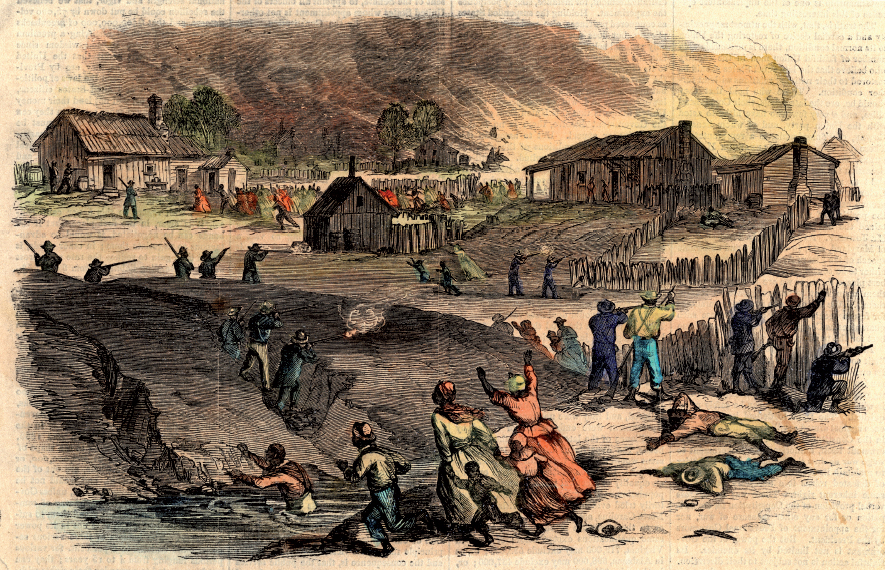Exploring American Histories: Printed Page 433
Exploring American Histories, Value Edition: Printed Page 359
Johnson and Congressional Resistance
Faced with growing opposition in the North, Johnson stubbornly held his ground. He insisted that the southern states had followed his plan and were entitled to resume their representation in Congress. Republicans objected, and in December 1865 they barred the admission of southern lawmakers, an action that Johnson denounced as illegitimate. Up to this point, it was still possible for Johnson and Congress to work together, if Johnson had been willing to compromise. He was not. Instead, Johnson pushed moderates into the Radical camp with a series of legislative vetoes that challenged the fundamental tenets of Republican policies toward African Americans and the South. In January 1866, the president refused to sign a bill passed by Congress to extend the life of the Freedmen’s Bureau for another two years. A few months later, he vetoed the Civil Rights Act, which Congress had passed to protect freedpeople in the South from the restrictions placed on them by the black codes. These bills represented a consensus among moderate and Radical Republicans on the government’s responsibility toward former slaves.
Explore
See Documents 14.1 and 14.2 for two perspectives on the Freedmen’s Bureau.
Johnson justified his vetoes on both constitutional and personal grounds. Along with Democrats, he contended that so long as Congress refused to admit southern representatives, it could not legally pass laws affecting the South. The chief executive also condemned the Freedmen’s Bureau bill because it infringed on the rights of states to handle their internal affairs concerning education and economic matters. Johnson’s vetoes exposed his racism and his lifelong belief that the evil of slavery lay in the harm it did to poor white Southerners, not to enslaved blacks. Johnson argued that these congressional bills discriminated against whites, who would receive no benefits under them, and put whites at a disadvantage with blacks who received government assistance. Johnson’s private secretary recorded in his diary, “The president has at times exhibited a morbid distress and feeling against the Negroes,” including those like Jefferson Long, who spoke out for their full civil rights.
Johnson’s actions united moderates and Radicals against him. In April 1866, Congress repassed both the Freedmen’s Bureau extension and Civil Rights Act over the president’s vetoes. In June, lawmakers adopted the Fourteenth Amendment, which incorporated many of the provisions of the Civil Rights Act, and submitted it to the states for ratification (see Appendix). Reflecting its confrontational dealings with the president, Congress wanted to ensure more permanent protection for African Americans than simple legislation could provide. Lawmakers also wanted to act quickly, as the situation in the South seemed to be deteriorating rapidly. The previous month, a race riot had broken out in Memphis, Tennessee. For a day and a half, white mobs, egged on by local police, went on a rampage, during which they terrorized black residents of the city and burned their houses and churches. “The late riots in our city,” the editor of a Memphis newspaper asserted, “have satisfied all of one thing, that the southern man will not be ruled by the negro.”
The Fourteenth Amendment defined citizenship to include African Americans, thereby nullifying the ruling in the Dred Scott case of 1857, which declared that blacks were not citizens. It extended equal protection and due process of law to all persons and not only citizens. The amendment repudiated Confederate debts, which some state governments had refused to do, and it barred Confederate officeholders from holding elective office unless Congress removed this provision by a two-thirds vote. Although most Republicans were upset with Johnson’s behavior, at this point they were not willing to embrace the Radical position entirely. Rather than granting the right to vote to black males at least twenty-one years of age, the Fourteenth Amendment gave the states the option of excluding blacks and accepting a reduction in congressional representation if they did so.
Johnson remained inflexible. Instead of counseling the southern states to accept the Fourteenth Amendment, which would have sped up their readmission to the Union, he encouraged them to reject it. Ironically, Johnson’s home state of Tennessee ratified the amendment, but the other states refused. In the fall of 1866, Johnson decided to take his case directly to northern voters before the midterm congressional elections. Campaigning for candidates who shared his views, he embarked on a swing through the Midwest. Clearly out of touch with northern public opinion, Johnson attacked Republican lawmakers and engaged in shouting matches with audiences. On election day, Republicans increased their majorities in Congress and now controlled two-thirds of the seats, providing them with greater power to override presidential vetoes.
